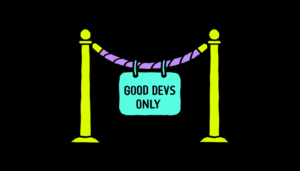What is ghosting?
Ghosting is the term used in situations when one side of a relationship (personal, professional, etc.) completely ignores another.
In freelancing, ghosting can be a huge problem, especially if you are a client. If you want to learn how to avoid being ghosted, follow the steps below, and your cooperation with freelancers will be fruitful and uninterrupted.

How to avoid ghosting on bidding platforms
Manage the process
Escrow
Use services that allow releasing payment in parts, after specified portions of work have been completed and once you check on the work quality. Ghosting is more tempting for unfair freelancers after they receive prepayment. Escrow and similar services guarantee that you pay only for the work completed.
Set the milestones
Be specific about the tasks you hand out. List clearly what you want a freelancer to do, and tell them what you plan to do next. Decide on the criteria of a successfully accomplished task.
Set realistic deadlines
Discuss deadlines with a freelancer you are hiring. Reserve a day or two for longer projects in case any unexpected emergencies occur (and they will, most likely). Demanding freelancers to work day and night just because you pay them sets them on the straight road to Burnoutville.
Give them what they need for work
If you need a freelancer to work on your CMS, provide them with a login and password for the guest account you created for this occasion. If you have relevant information sources, materials, and tools necessary for the job, share them with a freelancer. They will be able to get to the job sooner this way. You do not need to provide freelancers with personal or sensitive information.
Brief them well
The more detailed your brief is, the easier it will be for a freelancer to understand what you want from them, and the closer their final product will be to your requirements.
Don’t
“We want an SEO-optimized article on social media advertising”
Do
“We want a 1000-word article on the principles of advertising on Facebook. The title, meta-description, and sub-headings should include the following anchors (list all the anchors you want a freelancer to use). The keywords you must use are attached below (provide this list as well). Each segment of the article should be accompanied by a stock image. ”
Do not go for cheap services
Bidding freelance platforms are crowded with freelancers offering their services for ridiculously low prices. As tempting as it may be, do not risk your project by entrusting it to a contractor with low hourly/fixed rates. The lower they ask for their work, the less motivation they will have to finish the job or do it well.
Be a good client
Potential client ghosting can stem from your attitude, too. If you think freelancers see you as a saint because you are supposed to be paying them, you are wrong. Check the list below to ensure you don’t misbehave as a customer.
Personal communication
Arrange video calls with freelancers you want to hire. Introduce yourself, and make them see you. It is more difficult for a contractor to turn you down once they saw your face and spoke to you in person.
Clarify the freelancer’s expectations on the job
Miscommunication and misconceptions are common. Before you hire someone, make sure both of you have the same understanding of what needs to be done, what each of you should gain in the result, and what it will take to finish the job.
Avoid the “Customer is always right” attitude
You are equals. You have money, they have skills. You need each other.
You might say, “There are always more freelancers out there.” But you will have a hard time finding a professional willing to waste their time and effort on someone who doesn’t respect them.
Friendly communication
It is always more tempting to abandon a disrespectful customer. The rule of thumb here is to treat a freelancer the same way you treat a team member. If you want to make friends with them – good. If not, stay neutral.
Avoid threatening and preaching
Don’t
“If you don’t finish until March 1, I will not pay you a penny and find another freelancer.”
Do:
“I would appreciate if you finished the task by March 1.”
Of course, if a freelancer fails to meet deadlines, it is your right not to pay them. But the way you inform them about it is crucial. Politely declared terms and conditions tend to motivate freelancers. Threats may make them want to abandon your project.
Some customers like moralizing. They don’t threaten freelancers or act rudely towards them. Instead, they start preaching. They teach contractors how to behave. They call to freelancers’ piety and try to play on the sense of guilt (“We’ve been deceived so many times before, we hope you are not like the rest of freelancers here.”). They write brochures on how to apologize for ghosting a client and anonymously distribute them on the most popular freelance platforms.
Okay-okay, that’s a joke, but you’ve got the point: don’t teach contractors to behave. Instead, behave yourself.
Choose Wisely
Ghosting a former client is something that’s rarely left unmentioned in a freelancer’s testimonials. If a contractor has a history of ghosting, their former clients will most likely have left appropriate feedback. It is always a good idea to check user comments before hiring someone.
Also, watch out for scammers. Bidding freelance platforms may accommodate cheaters of all sorts. Check out our article on how to recognize a scammer freelancer.
Yet another way to keep yourself safe from ghosting is to hire on freelance platforms for vetted devs, such as Lemon.io. The main feature of such websites is that freelancers applying to cooperate with them are first tested for their professional skills. In particular, here at Lemon.io, we have developed a 4-stage process of evaluating freelance developers.
General check
During this stage, we do the background check on a contractor, contact their former employers for testimonials, and review portfolios. We also pay attention to their communication skills and proficiency in the English language.
Test task
A test task we hand out to our candidates is usually something our team is currently working on. This way, we can test a freelancer in conditions close to real work.
Candidate evaluation
We pay attention to whether a candidate could finish the job on time, the quality of the code written, and other parameters related to a freelancer’s direct professional duties.
Live interview
Even if a person is a skilled professional, it does not automatically make us hire them. Since freelancers we hire will be working with our customers, we need to ensure their communication skills are adequate. We interview the candidates in person, paying attention to how they behave and talk, whether they are friendly, cooperative, etc.
This whole process is called vetting. We at Lemon.io are not Ghost Busters, of course, but due to vetting, we make sure our clients are never ghosted by freelancers they hire from us.
Protect yourself from ghosts – hire at Lemon.io!









